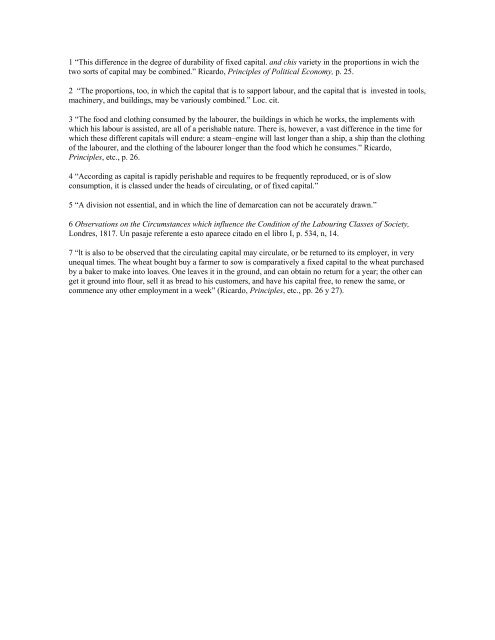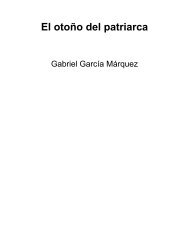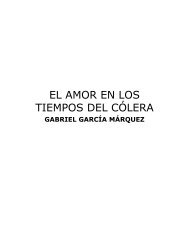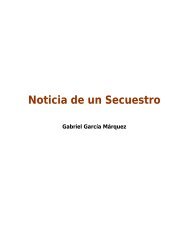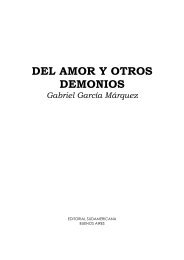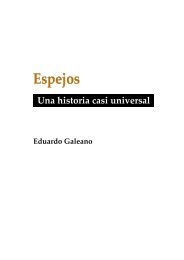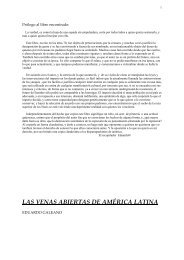- Page 1 and 2:
INDICE GENERAL Tomo Segundo Prólog
- Page 3 and 4:
I. LA CIRCULACIÓN DE LA PLUSVALÍA
- Page 5 and 6:
Prólogo No era empresa fácil prep
- Page 7 and 8:
égimen rural norteamericano y prin
- Page 9 and 10:
que Marx, sólo que de un modo much
- Page 11 and 12:
"Tan pronto como la tierra se convi
- Page 13 and 14:
educir el valor al trabajo, era red
- Page 15 and 16:
pesar de ello, con respecto a los o
- Page 17 and 18:
verdaderos términos y, al plantear
- Page 19 and 20:
Sección Primera LAS METAMORFOSIS D
- Page 21 and 22:
producción que se compren deberán
- Page 23 and 24:
ealiza la función de capital-diner
- Page 25 and 26:
el poseedor del dinero y el poseedo
- Page 27 and 28:
proporciones cada vez mayores, hast
- Page 29 and 30:
necesarias para su propio sustento,
- Page 31 and 32:
3. Tercera fase: M'-D' La mercancí
- Page 33 and 34:
esterlinas, no hará más que repon
- Page 35 and 36:
del dinero en mercancía y de ésta
- Page 37 and 38:
principal y la suma accesoria, el c
- Page 39 and 40:
mercancías, donde es el producto d
- Page 41 and 42:
dinero, capital productivo y capita
- Page 43 and 44:
A medida que se va apoderando de la
- Page 45 and 46:
Mp que es lo único que va implíci
- Page 47 and 48:
ven necesariamente retenidos ambos
- Page 49 and 50:
5. Y esto, cualquiera que sea el mo
- Page 51 and 52:
contenida también en él, que exis
- Page 53 and 54:
Primero. Puesto que la fórmula M'-
- Page 55 and 56:
La relación existente entre el cic
- Page 57 and 58:
mercancías que no figuran todavía
- Page 59 and 60:
en vez de su primitiva forma de cap
- Page 61 and 62:
totalidad, y con él el consumo ind
- Page 63 and 64:
ciclos, hasta adquirir el volumen c
- Page 65 and 66:
En P... P', P' no expresa que se ha
- Page 67 and 68:
en cuenta, asimismo, que las condic
- Page 69 and 70:
invertirse el capital-dinero rebasa
- Page 71 and 72:
CAPITULO III EL CICLO DEL CAPITAL-M
- Page 73 and 74:
vende, por el momento 8,440 libras
- Page 75 and 76:
demostrar que la libra de hilado po
- Page 77 and 78:
elementos de las mercancías se aba
- Page 79 and 80:
el proceso inicial de circulación
- Page 81 and 82:
Notas no tiene el capítulo 3
- Page 83 and 84:
de sus fases presenta la misma cont
- Page 85 and 86:
ella se exprese constantemente una
- Page 87 and 88:
de los precios), es posible que est
- Page 89 and 90:
eferente a la rotación. Lo único
- Page 91 and 92:
se dividirla entre el fabricante, e
- Page 93 and 94:
por parte del comprador, la realiza
- Page 95 and 96:
Y lo que decimos del capitalista in
- Page 97 and 98:
Aquí, prescindimos del crédito, y
- Page 99 and 100:
producción, o bien funciona en el
- Page 101 and 102:
en proporción a lo que dura. Esta
- Page 103 and 104:
tiempo de circulación como mercanc
- Page 105 and 106:
tiene necesariamente que preceder a
- Page 107 and 108:
función consume, por tanto, de una
- Page 109 and 110:
producción proseguidos simplemente
- Page 111 and 112:
punto son comunes a toda producció
- Page 113 and 114:
elementos, para hacer frente a todo
- Page 115 and 116:
productor, no altera para nada las
- Page 117 and 118:
gastos son los mismos; pero como ah
- Page 119 and 120:
transporte y en otros tantos obliga
- Page 121 and 122:
LA ROTACION DEL CAPITAL Capítulo V
- Page 123 and 124:
sumandos dan el tiempo de rotación
- Page 125 and 126: Esta parte del valor-capital plasma
- Page 127 and 128: confusión que se advierte en el mo
- Page 129 and 130: El análisis del proceso de trabajo
- Page 131 and 132: queremos referirnos, por el momento
- Page 133 and 134: estaciones, centros de gran tráfic
- Page 135 and 136: maquinaria. En las instalaciones fe
- Page 137 and 138: De esto como del restante carácter
- Page 139 and 140: ampliación y otras veces forma par
- Page 141 and 142: Great Northern.....................
- Page 143 and 144: Capitulo IX LA ROTACION GLOBAL DEL
- Page 145 and 146: agoten físicamente. Puede suponers
- Page 147 and 148: a fuerza de trabajo, de una parte,
- Page 149 and 150: inversión del capital. Equivalen a
- Page 151 and 152: forma de salarios que se pagan a lo
- Page 153 and 154: ellas. Y todos los elementos del ca
- Page 155 and 156: ocurre tratándose del capital fijo
- Page 157 and 158: encaminados a la satisfacción de l
- Page 159 and 160: ser ya una forma de su capital. Des
- Page 161 and 162: sólo es aplicable a los elementos
- Page 163 and 164: con las casas-vivienda, etc., perte
- Page 165 and 166: la parte constante. Sólo guarda re
- Page 167 and 168: CAPITULO XI TEORIAS SOBRE EL CAPITA
- Page 169 and 170: sea igual, superior o inferior al v
- Page 171 and 172: La función del medio de trabajo en
- Page 173 and 174: por medios de subsistencia, al igua
- Page 175: Tanto Ricardo como Barton 6 confund
- Page 179 and 180: Durante todo el período de trabajo
- Page 181 and 182: haciendo anticipos gradualmente al
- Page 183 and 184: y que es, naturalmente, el que fija
- Page 185 and 186: Capitulo XIII EL TIEMPO DE PRODUCCI
- Page 187 and 188: ocurre, por ejemplo, en Rusia. En a
- Page 189 and 190: equiere la acción del hombre ni de
- Page 191 and 192: mucho. Finalmente, todos los aperos
- Page 193 and 194: Capitulo XIV EL TIEMPO DE CIRCULACI
- Page 195 and 196: ahora situados al lado de vías de
- Page 197 and 198: después de entregada en su totalid
- Page 199 and 200: Notas no tiene
- Page 201 and 202: de tiempo dada funcionará un capit
- Page 203 and 204: Comparando entre sí estos tres eje
- Page 205 and 206: la noción confusa de que este capi
- Page 207 and 208: ajo la forma de capital productivo,
- Page 209 and 210: Capital I: 5 2/3 X 600 = 3,400 libr
- Page 211 and 212: El segundo período de rotación ab
- Page 213 and 214: Capital III Períodos de Períodos
- Page 215 and 216: Sí nos fijamos un poco de cerca en
- Page 217 and 218: tiene que existir, es decir, reflui
- Page 219 and 220: mecanismo de la rotación, ¿de dó
- Page 221 and 222: de dinero directamente, de segunda
- Page 223 and 224: Capítulo XVI LA ROTACIÓN DEL CAPI
- Page 225 and 226: 100 Llamaremos capital A al capital
- Page 227 and 228:
capital variable en acción produce
- Page 229 and 230:
5,000 10 = 500 libras En realidad,
- Page 231 and 232:
B. La cuota anual de la plusvalía
- Page 233 and 234:
= p'n. Y como la cuota real de la p
- Page 235 and 236:
eposición de valor aparece bajo un
- Page 237 and 238:
amasan grandes riquezas. Provocan e
- Page 239 and 240:
Capítulo XVII LA CIRCULACIÓN DE L
- Page 241 and 242:
halle formado simplemente por el di
- Page 243 and 244:
da el nombre de seguridad a la perp
- Page 245 and 246:
capital-mercancías que necesita vo
- Page 247 and 248:
Pero los economistas burgueses cons
- Page 249 and 250:
circulación. ¿No puede esta suma
- Page 251 and 252:
Ahora, estas 1,000 libras refluyen
- Page 253 and 254:
desplegado anualmente por los obrer
- Page 255 and 256:
capital de la sociedad, incluido po
- Page 257 and 258:
Las mercancías adicionales que nec
- Page 259 and 260:
Si, por el contrarío, se parte del
- Page 261 and 262:
circulación. Y por medio di la mis
- Page 263 and 264:
El ciclo de los capitales individua
- Page 265 and 266:
la fuerza de trabajo, los medios de
- Page 267 and 268:
y las combinaciones sociales relaci
- Page 269 and 270:
El retroceso de Adam Smith 2 en su
- Page 271 and 272:
2º A. Emith huye, de su propia teo
- Page 273 and 274:
“Ahora bien, aun cuando es necesa
- Page 275 and 276:
que una parte de valor de la otra c
- Page 277 and 278:
estos elementos y del límite de su
- Page 279 and 280:
necesario para la reproducción del
- Page 281 and 282:
La parte de valor de toda mercancí
- Page 283 and 284:
En cambio, el dinero que el obrero
- Page 285 and 286:
tres partes distintas. En el primer
- Page 287 and 288:
trabajo de seis días. Pues bien: l
- Page 289 and 290:
saber en qué medida este valor cre
- Page 291 and 292:
Resultado: la confusión de pensami
- Page 293 and 294:
interesados en ellas en cantidades
- Page 295 and 296:
I. 4,000 c + 1,000 v + 1,000 p = 6,
- Page 297 and 298:
circulación de sus mercancías, co
- Page 299 and 300:
esterlinas en concepto de salarios;
- Page 301 and 302:
absorbida como renta, según Adam S
- Page 303 and 304:
mercancías se desarrolla de un mod
- Page 305 and 306:
(1,000 libras esterlinas, forma-din
- Page 307 and 308:
ealizase el valor del capital encer
- Page 309 and 310:
produce y otra parte emigraría a o
- Page 311 and 312:
En el producto total anual de la so
- Page 313 and 314:
capital constante bajo su forma nat
- Page 315 and 316:
año, el nuevo valor creado en form
- Page 317 and 318:
1,000) de su capital constante repr
- Page 319 and 320:
asimismo necesario, en general, par
- Page 321 and 322:
valor. Las materias primas y materi
- Page 323 and 324:
ha de reponerse en especie una part
- Page 325 and 326:
partida (siendo indiferente, para e
- Page 327 and 328:
A la parte 1: 100, es decir, solame
- Page 329 and 330:
manos de I, un fragmento de la plus
- Page 331 and 332:
fijo; que puede y debe producirse p
- Page 333 and 334:
Observaremos acerca de esto, resumi
- Page 335 and 336:
3. Mientras que los otros capitalis
- Page 337 and 338:
de 500 libras, lo cual más bien pa
- Page 339 and 340:
necesidades y destinen las 20 resta
- Page 341 and 342:
5. Ad notam de ciertos secuaces de
- Page 343 and 344:
capital productivo. Pero, en realid
- Page 345 and 346:
pasivo y como una cantinela del por
- Page 347 and 348:
no es sino su capital constante y v
- Page 349 and 350:
Si los vendedores del producto sobr
- Page 351 and 352:
El productor de oro puede acumular
- Page 353 and 354:
que en el sector I sólo se ha efec
- Page 355 and 356:
es decir, se la convierte en elemen
- Page 357 and 358:
La retirada de este dinero de la ci
- Page 359 and 360:
800 IIp. Sí, por el momento, presc
- Page 361 and 362:
superproducción relativa de la cla
- Page 363 and 364:
desempeñan un papel importante en
- Page 365 and 366:
Si aquí I acumula, como hasta ahor
- Page 367 and 368:
las materias primas, artículos a m
- Page 369 and 370:
Apendices V. I. LENIN Fragmento del
- Page 371 and 372:
aldea, de la heredad, de la tribu,
- Page 373 and 374:
déficit de consumo? Evidentemente,
- Page 375 and 376:
“producción carente de planes”
- Page 377 and 378:
PIE DE PAGINA 1 Lenin, Obras comple
- Page 379 and 380:
V. I. LENIN Fragmento de la obra
- Page 381 and 382:
la parte de los medios de subsisten
- Page 383 and 384:
medios de reproducción. Esta se re
- Page 385 and 386:
proletaria) existe, indudablemente,
- Page 387 and 388:
amenazados de semejante crisis desi
- Page 389 and 390:
capitalista de un país. Es falso p
- Page 391 and 392:
Paralelamente con el proceso de la
- Page 393 and 394:
y su afán de no entender la teorí
- Page 395 and 396:
V. I. LENIN LA TEORIA DE LA RENTA E
- Page 397 and 398:
se produce la destrucción del rég
- Page 399 and 400:
suelo, la cual sólo permite al ter
- Page 401 and 402:
V. I. Lenin Capítulo II de la obra
- Page 403 and 404:
Exactamente el mismo que el de las
- Page 405 and 406:
V. I. LENIN OBSERVACION SOBRE EL PR
- Page 407 and 408:
también en cuanto al concepto. Las
- Page 409 and 410:
ya que ellos no se hallaban ni siqu
- Page 411 and 412:
1 Este artículo, escrito en febrer
- Page 413 and 414:
para un órgano obrero, el periódi
- Page 415 and 416:
deduce con claridad si las notas bi
- Page 417 and 418:
cuatro partes) y la biografía que
- Page 419 and 420:
como las que aquí se desarrollan s
- Page 421 and 422:
jornada y hace que el obrero trabaj
- Page 423 and 424:
estudios, dando con ella una base c
- Page 425 and 426:
tiene, pues, nada de extraño que s
- Page 427 and 428:
jamás modela los hechos arbitraria
- Page 429 and 430:
le deja, por tanto, una ganancia de
- Page 431 and 432:
seguir trabajando algún tiempo má
- Page 433 and 434:
industrial de reserva, tanto mayor
- Page 435 and 436:
equivocarse que la tirada de la pri
- Page 437 and 438:
NOTAS EXPLICATIVAS TOMO SEGUNDO 1 E
- Page 439 and 440:
INDICE ALFABETICO DE NOMBRES CITADO


